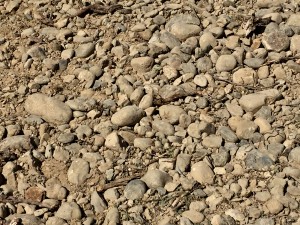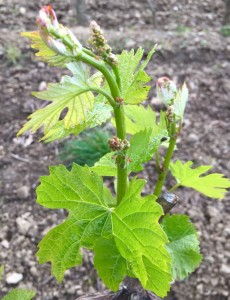April sweeps in on the wings of a song: the weather is magnificent, truly springlike – no other word for it. A little bit of rain here and there, a lot of sunshine everywhere, cool nights, temperate days: this is Spring as Spring should be…. or at least, at the beginning of the month it is. (Who knows what the end will hold?) The vines respond and joyfully wave flags of palest green, their leaves unfurling with intense concentration, like slowly unclenching fists. Elsewhere in the world, all attention is focused on Libya, on Brexit, on 800 million Indians going to the poll, on the elections of Sissi and BiBi, on the impending demise of our insect population, and on the blazing heart of Paris as the spire of Notre Dame topples over like a mighty metaphor of the burning questions of our times – but here, self-absorption is the order of the day, and all 88,888 vines devote themselves solely, exclusively and single-mindedly to the business of renewing their vegetative cycle.
Monday 1 April
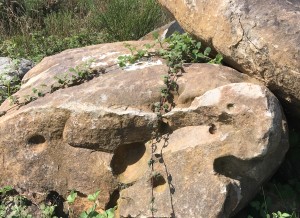 These rocks are intriguing. They used to be piled on the corner of an unplanted triangle between two fields of chenin blanc that didn’t belong to us. We bought those two fields, and hey presto! the enormous boulders promptly got up on their feet and walked off. The very next day they were nowhere to be seen. They must weigh at least a ton each, so this is no easy walk.
These rocks are intriguing. They used to be piled on the corner of an unplanted triangle between two fields of chenin blanc that didn’t belong to us. We bought those two fields, and hey presto! the enormous boulders promptly got up on their feet and walked off. The very next day they were nowhere to be seen. They must weigh at least a ton each, so this is no easy walk.
In due course of time, a few years later, we bought the unplanted triangle. And sure enough, those very same boulders tiptoed back in the dead of night, and artfully arranged themselves not far from their original spot.
To this day, we haven’t a clue how, where or why. Let’s hope they’re there to stay, even though their their story is still untold:
They have small, perfectly smooth, round indentations, reminiscent of the holes at the entrance to Knock Drum, an old Celtic fort in W Cork. Those are said to be the result of constantly rubbing wood against the stone to make fire. Where do these come from? We posted the question on twitter and got a reply from Argentina, where similar indentations are the result of prehistoric wheat threshing. And a Master of Wine friend sent a link to a German scientific study of the Steinlaus, a louse with an insatiable and unstoppable appetite for stone. Aghast we watched a documentary showing buildings being brought to their knees as the mighty stone louse made his way through their foundations.
And then we noticed today’s date.
Monday 8 April
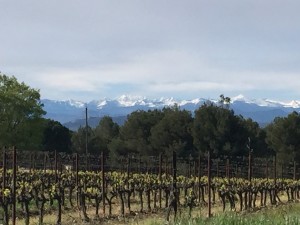 It’s undeniably beautiful almost impossible to stay indoors.
It’s undeniably beautiful almost impossible to stay indoors.
Yesterday’s sky shot a few little well-aimed bullets of hail, camouflaged as thick raindrops our way. No damage at all, just a nasty little reminder of what can happen.
Further east, in the Herault, the fruit farmers were badly hit. We breath a sigh of relief for our wine growing friends there. We all know how the fruit farmers are feeling… and we are glad not to be feeing that feeling that ourselves.
The two Jans head off to the South West for an Open-Door Tasting with our regional agent there.
And those of us on the home front give up, snap our computers shut, and go for a long walk.
Tuesday April 9
“terroir | tɛrˈwɑː, French tɛrwar | noun
the complete natural environment in which a particular wine is produced, including factors such as the soil, topography, and climate.”
From the Medieval Latin: terratorium.
So here’s a fine bit of terroir. It’s at the top of our field called Tournié, where with reluctance and after much heated discussion, it was decided to pull out chardonnay vines that were well over 50 years old.
The field is sitting fallow, biding its time and waiting to be planted with chenin blanc next year.
Undressed as it is, suddenly all the parts of its whole are rudely exposed. The top of it, at the top left hand corner, is so stony it is almost impossible to imagine a plant of any kind thriving there. It is right on the final edge of a high terrace formed by the Aude river below, and full of pebbles. With chunks of quartz, feldspar and miscellaneous whatnot thrown in for good measure.
And then the field sweeps down in a gentle slope, and becomes more hospitable where we’re standing, admiring it.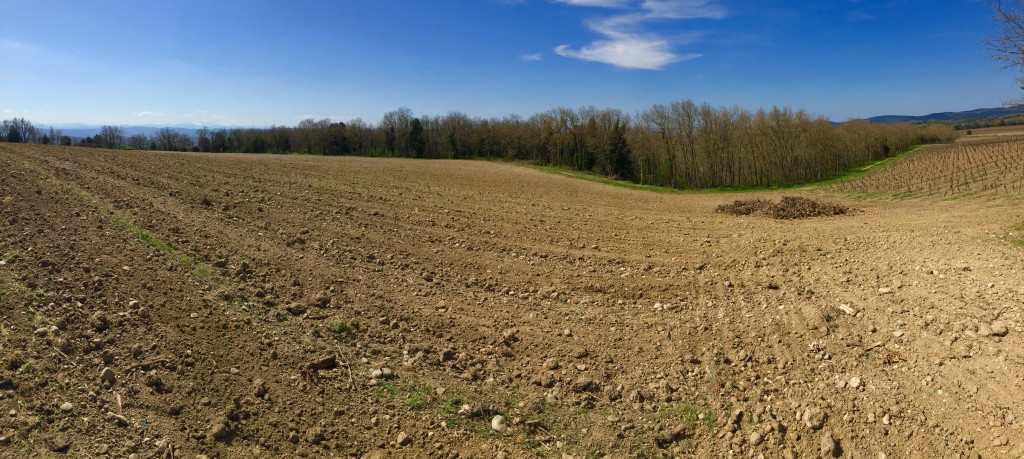
No good already anticipating what affect this will have on the new vines or the wines they feed: it will be four years at least before we can taste the proof these pudding stones.
Thursday April 11
But this morning it’s the 2018 wines we’re tasting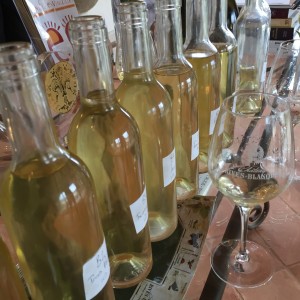 .
.
Over the past few months, we have been tasting the wine in the barrels, one by one, giving them report cards, and watching their personalities and character develop.
The least promising were put to one side, and the rest divided up into bottles representing different parcels. and different potentials. And then we set to work.
Because we had such a small harvest last year, the job was done by lunchtime.
It was the most miserable harvest of all time, but by the time we sat down to lunch, there were smiles all round. We think we have a really good Odyssée and a great Dédicace in the bag.
Too bad about Trilogie, Occitania, Le Limoux, Crémant Blanc de Blancs, and VintageRose who all fell by the wayside, victims of hail and of the worst outbreak of mildew ever recorded in over 70 years: an impossible, imponderable, improbable combination of circumstances most horribly exacerbated by the limitations of organic viticulture.
We raise a glass of vin very ordinaire at our local eating place to these absent friends who didn’t make it through the perilous path of 2018, and hope that this year will be better.
And there’s no guarantee of that. The spores of mildew are still in the ground, ready to raise their heads at the drop of a hat. Today we saw the very first sign of the very first little embryonic bunch of grapes on the chardonnay. We also saw some leaves with brownish fringes, suffering either from cold, or from lack of water – and that was a lot less nice to see.
Thursday April 17
No sooner has the blend of the barrels been decided, than Jan-Ailbe throws the cellars into frenzied action: mixing the wines, 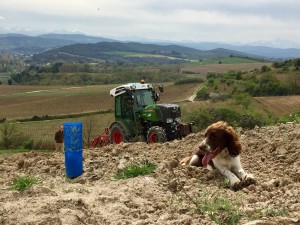 storing them in tanks, taking the empty barrels outside, washing them, cleaning the floor and walls, putting the barrels back in again …
storing them in tanks, taking the empty barrels outside, washing them, cleaning the floor and walls, putting the barrels back in again …
And the action in the vineyard is also non-stop: no sooner had we finished weeding between the vines, than we had to hitch the mechanical weeder back on to the tractor and go out again. Ploughing’s done, but the the truffle field still needs a go.
We have a state-of-the-art tractor, complete with computer, joystick, hydraulics, air-conditioning, gold taps and other equally wunderbahr added extras, called a Fendt. “Wer Fendt fährt führt”, the manufacturers proclaim proudly. Our tractoriste is Alsatian, so he perfectly understands what they mean. But both the Fendt and Nicolas, despite their perfect understanding, came to a halt on the steep, bumpy, slope. It leaned horribly, the Fendt did, as if it were going to topple over altogether. The figure of Nicolas, hunched over the wheel (or was it the joystick?) dissolved into a blurred white face frozen in fear on the other side of the window. We were all terrified, and hastily called it a day.
Benson, the Springer Spaniel, however, remained unimpressed by the day’s work.
Wednesday April 24
We have lunch every Wednesday at the butcher’s, Barrail, in the village: a meaty affair, full of home-made patés, sausages, dried meats, cured this and confit of that, with a good local rustic vin ordinaire, which is perfectly drinkable and a lot better than many more elegantly labelled bottles. A few weeks ago, Monsieur Barrail presented us with kangaroo. Kangaroo, I ask you, in Cépie? Did it come from the local Australian Park, I asked nervously?
Today we’re driving down the backroad to Cépie, wondering what Monsieur Barrail has cooked up for us. It’s a lovely day, one of those cool, crisp clear days when you feel glad to be alive. The hills are singing; they’re alive too .. with the sound of — oh, never mind, but very pristine, perfect, and full of song. We pass the truffle field, which is actually one of our prettiest fields, not in spite of, but because of, its steep slope. We look down on it through the window of the car: it is a bucolic scene, JanAilbe on his knees tending the fledgling truffle trees, and Nicolas ploughing under the singing mountains …. Nicolas in the tractor … the tractor, the tractor!! Jump out of the car screaming at Jan who has his back to us and to the tractor, and is actually a bit too far away to hear. “Nicholas! The tractor! The tractor!” we scream with intensified urgency. By the time he turns around, it is all over, and the tractor has righted itself.
But we were shaking. If you’d seen the tractor literally rearing straight up like a horse on its hind legs, you’d be shaking too. So would Jan-Ailbe and so would Nicolas – but none of them saw it.
But that’s that. That field will no longer ever be ploughed up and down again. Now it’s only down-down.
And we have absolutely no memory of what we had for lunch. If a tractor can rear, then there’s no saying what a kangaroo can do.
Saturday April 27
This is not what we call fun. We’re at Toulouse airport way too early, as usual, and the plane is delayed, as usual. Jan gets restless from sitting so long in one spot and goes on a little walkabout. He passes the airline counter and asks what the situation is. Comes back grim-faced. We won’t make our connection to New York, he says.
“But don’t worry” he says, “they’ve put us on Air France to Paris and then to JFK. But we must rush”.
“But the bags…?” Oh yes, the bags. We run the length of the airport, collect them from the baggage carousel where they have mysteriously arranged themselves in orderly, solitary splendour. Another dash to the Air France counter. Arrive panting.
“Ah non, Monsieur”, they say, “we can only give you a ticket to Paris. You have to be on the waiting list to New York”.
Back through customs again. Ran the length of the airport again. Boarded immediately. Arrived at Charles de Gaulle and did the marathon across the length of that extremely long airport, arrived panting at the ticket counter.
The bad news: the flight’s delayed.
The good news: we’ll be on it.
We sink into a chair and wait despondently. The Ap on our phones tells us we’ve walked / run 6 km across two airports, and the trip has hardly begun.
“Flying’s no fun,” Jan says, “I’m never flying again.”
Oh yeah, is that so?
To be continued /……

